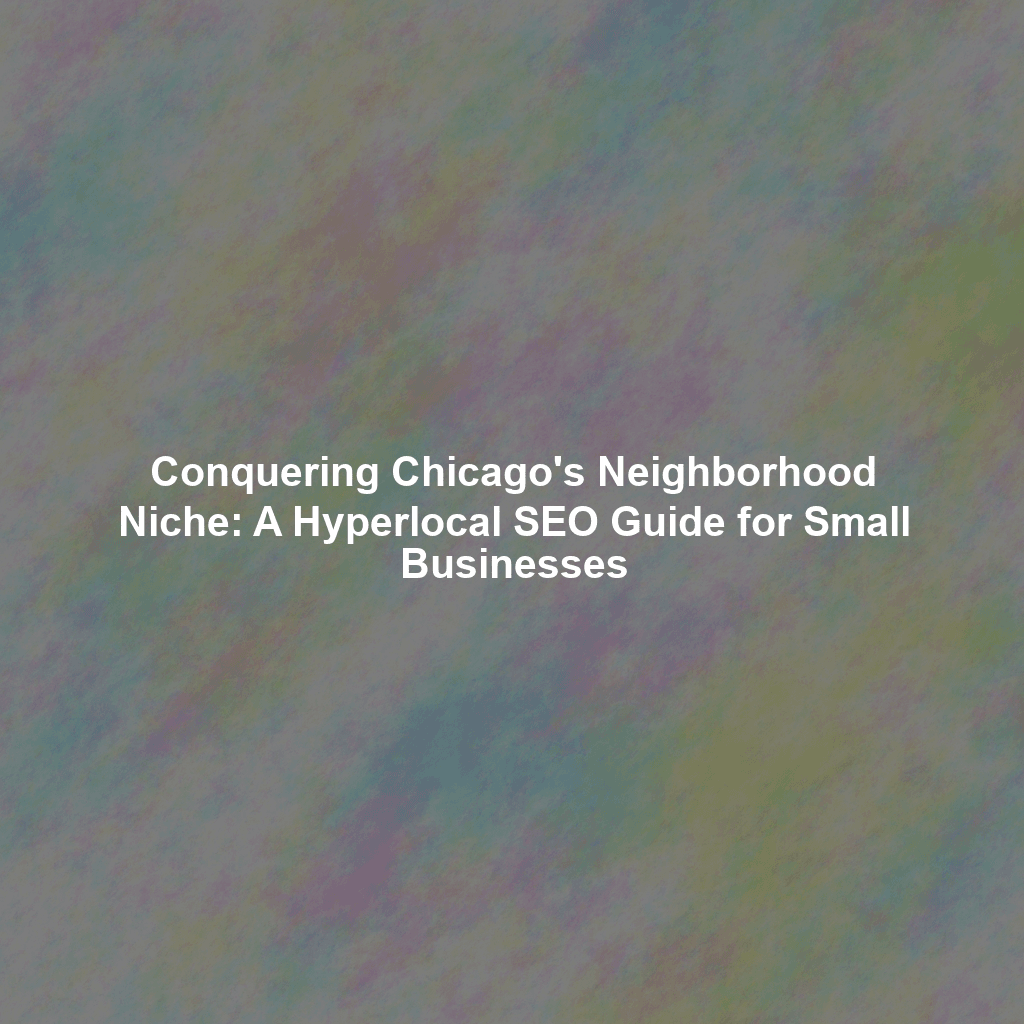Chicago, a city of neighborhoods, each with its own distinct personality, culture, and charm. For small businesses, this presents both a unique opportunity and a challenge. The opportunity? To connect deeply with a specific local community. The challenge? Navigating the vast digital landscape and ensuring your business stands out in the right neighborhood search results. This guide dives deep into hyperlocal SEO strategies tailored for Chicago’s diverse communities, helping you attract nearby customers and thrive in your local market.
Understanding Chicago’s Neighborhood Dynamics for Effective SEO
Before even thinking about keywords, it’s crucial to understand the nuances of Chicago’s neighborhoods. What makes Lincoln Park different from Logan Square? What are the key demographics in Andersonville? Understanding these distinctions is fundamental to tailoring your SEO efforts for maximum impact.
Researching Your Target Neighborhood
Don’t rely on assumptions. Conduct thorough research on your target neighborhood:
- Demographics: Age, income, family status, education level. Resources like the U.S. Census Bureau and Chicago City Data are invaluable.
- Community Events: Local festivals, farmers’ markets, street fairs – these provide opportunities for participation and content creation.
- Local Publications: Neighborhood newspapers, online blogs, and social media groups are goldmines for understanding local concerns and trends.
- Competitor Analysis: Identify businesses similar to yours in the area and analyze their online presence. What keywords are they targeting? What content are they creating?
Hyperlocal Keyword Research: Finding Your Neighborhood’s Search Terms
Generic keywords like “coffee shop Chicago” are too broad. You need to laser-focus on neighborhood-specific keywords to attract relevant local traffic.
Using Location-Based Keywords
Incorporate neighborhood names into your keywords. Examples:
- “Roscoe Village Bakery”
- “Wicker Park Plumber”
- “Lakeview Dog Walker”
- “Andersonville Mediterranean Restaurant”
Long-Tail Keywords: Answering Specific Customer Questions
Long-tail keywords are longer, more specific phrases that people use when searching for something very particular. These are highly valuable because they indicate a clear intent.
- “Best brunch spots in River North with outdoor seating”
- “Emergency plumbing repair in Ukrainian Village”
- “Affordable hair salon in Pilsen for curly hair”
Tools for Keyword Research
Utilize tools like Google Keyword Planner, SEMrush, Ahrefs, or even free options like Google Trends to identify popular and relevant keywords for your target neighborhoods.
Targeted Content Creation: Speaking Directly to Your Local Audience
Content is king, and hyperlocal content is emperor in Chicago’s neighborhood SEO arena. Create content that resonates with the specific interests and needs of your target neighborhood.
Neighborhood-Specific Blog Posts
Write blog posts that are relevant to your local community. Examples:
- “Top 5 Reasons to Live in Bucktown” (for a real estate agent)
- “Supporting Local Artists in Logan Square” (for a gallery or framing shop)
- “A Guide to Summer Festivals in Lincoln Park” (for any local business)
Local Guides and Resources
Create helpful guides and resources that cater to local residents. This establishes you as a trusted authority.
- “The Ultimate Guide to Restaurants in West Loop”
- “A Parent’s Guide to Parks and Playgrounds in Lincoln Square”
- “Sustainable Shopping Options in Edgewater”
Showcase Your Involvement in the Community
Highlight your participation in local events, sponsorships, or charitable initiatives. This builds trust and demonstrates your commitment to the neighborhood.
Hyperlocal Link Building: Connecting with Local Websites
Link building is crucial for boosting your SEO ranking. Focus on acquiring backlinks from reputable local websites.
Local Directories and Business Listings
Ensure your business is listed in prominent online directories like Yelp, Google My Business, Foursquare, and industry-specific directories. Verify that your NAP (Name, Address, Phone number) information is consistent across all listings.
Partnerships with Local Businesses
Collaborate with other local businesses for cross-promotional opportunities. Guest blogging, joint events, or reciprocal link exchanges can benefit both parties.
Engage with Local Media and Influencers
Reach out to local newspapers, blogs, and social media influencers to gain coverage for your business. Offer exclusive discounts or promotions to their followers.
Optimizing Your Google My Business Profile
Your Google My Business (GMB) profile is the cornerstone of your local SEO strategy. Ensure it’s fully optimized:
- Accurate Information: Verify your NAP information is correct and consistent.
- Category Selection: Choose the most relevant categories for your business.
- High-Quality Photos: Upload professional photos of your business, products, and services.
- Customer Reviews: Encourage customers to leave reviews and respond promptly to both positive and negative feedback.
- Posts: Regularly create posts to share updates, promotions, and events.
Monitoring and Adapting Your Strategy
SEO is an ongoing process. Continuously monitor your website’s performance, track your keyword rankings, and analyze your website traffic. Adapt your strategy based on the data and insights you gather.
Using Google Analytics and Google Search Console
These tools provide valuable insights into your website’s traffic, keyword performance, and overall SEO health. Use them to identify areas for improvement and track the effectiveness of your strategies.
Conclusion
Conquering Chicago’s neighborhood niche requires a deep understanding of local dynamics, targeted keyword research, compelling content creation, and strategic link building. By focusing on hyperlocal SEO strategies, small businesses can effectively connect with nearby customers, build brand awareness, and thrive in Chicago’s vibrant and diverse communities. Remember to stay consistent, monitor your results, and adapt your strategy as needed to achieve long-term success. Good luck navigating the Windy City’s digital landscape!
 Skip to content
Skip to content

